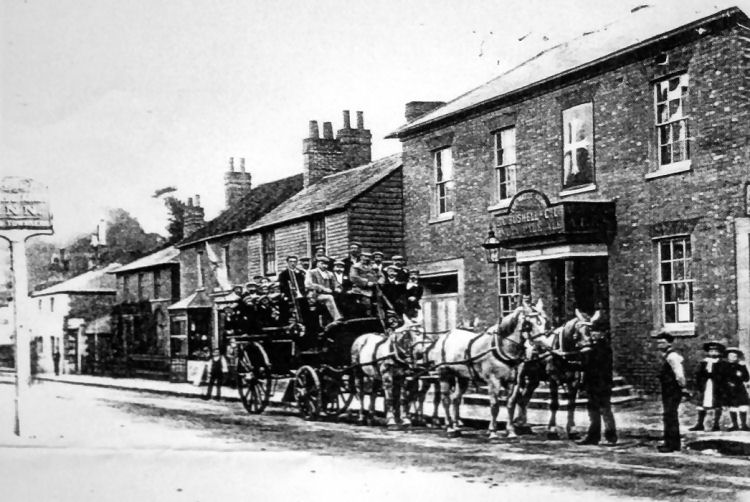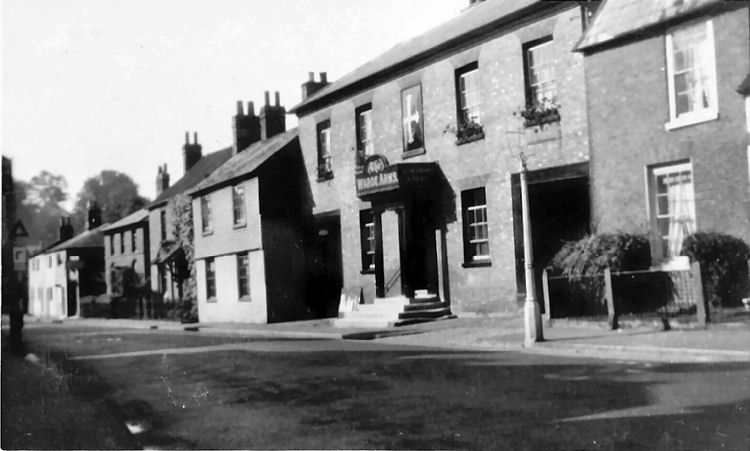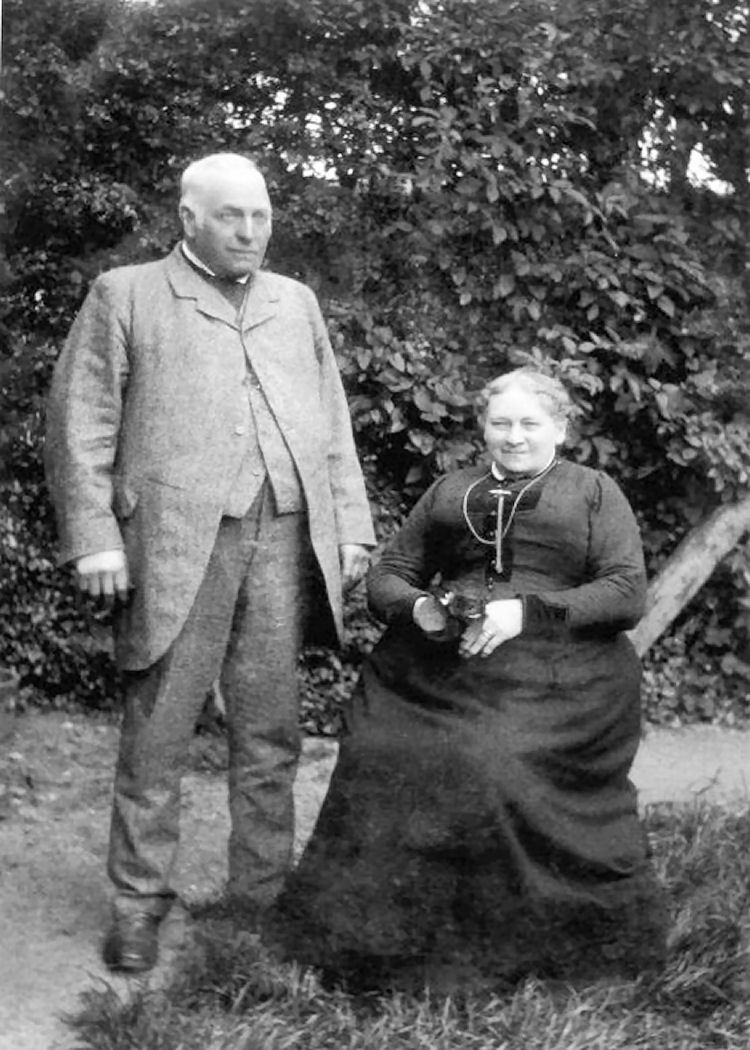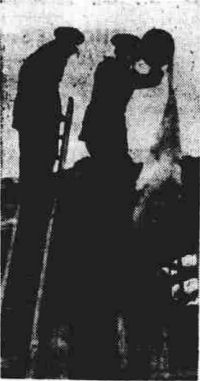|
32-34 High Street
Westerham

Above photo, 1904, kindly sent by Debi Birkin. Showing the Pride of
Westerham, one of several coaches operated by the licensee, John
Townsend. |

Above photo, circa 1933, kindly sent by Rory Kehoe. |

Above photo circa 2016. |
Many of the early Inns were owned by the Lord of the Manor, who would
probably let them to his steward. From this originated such names as "The
Warde Arms."
I have recently (Nov 2016) seen this house as sold on a Durling's web
site and referred to as the "Warde Arms and Cormorant House." It is said
that it is office buildings (2 interconnecting) with planning consent to
provide 2 houses.
|
South Eastern Gazette 25 June 1839.
Pursuant to the Act for the Relief
of Insolvent Debtors in England.
The COURT for RELIEF of INSOLVENT DEBTORS. The following Prisoners,
whose Estates and Effects have been vested in the Provisional Assignee
by order of the Court, having filed their Schedules, are ordered to be
brought up before a Commissioner on Circuit to be dealt with according
to the Statute—as follows, Alexander Mills, formerly of Westerham, in the County of Kent, Corn
Factor, Omnibus and Van proprietor, then of the “Warde Arms” Westerham
aforesaid, Innkeeper, Cornfactor and Omnibus and Van Proprietor; thereof
Westerham aforesaid, Cornfactor and Van proprietor; and late of the same
place, Livery Stable keeper. |
|
Kentish Gazette, 10, December 1839.
Westerham, Kent.
To post Masters, Taverns Keepers, and Others.
Excellent household furniture, fixtures, and fittings, of the "Ward Arms
Inn," Nine useful horses, Carriages, Phaeton, two Four-wheel chaises,
Pair Horse Van, Harness, and effects.
To be sold by auction, by Messrs Ventum and Hughes.
On the premises, the "Ward Arms Inn," High Street, Westerham, by order
of the assignees of Nathaniel Davies, bankrupt, on Thursday, 12th of
December, 1839, and following day, at Eleven, the whole of the excellent
and modern furniture.
Comprising mahogany pillar and inpanneled tent and French bedstead,
seasoned beils and bedding, wardrobes, chests of drawers, looking
glasses, Brussels and Kidderminster carpets, sets of dining and other
tables, mahogany chairs, eight day dial, window curtains, pedestal
sideboard, plate, linen, china, glass, culluary utensils, and the
customary effects of a well frequented inn.
Also the whole of the superior household furniture, pianoforte, and
effects, at the private residents.
May be viewed the day preceding the sale. Catalogues had on the premises
of Messrs. Newington and Stenning solicitors, Tonbridge, "Crown,"
Sevenoaks, "White Hart," Godstone, "Crown," Croydon, "White Hart,"
Bromley, and of Messrs. Venton and Hughes, Angel Court, Throgmorton
Street.
|
|
Maidstone Journal and Kentish Advertiser, Tuesday 27 June 1843.
1843 SEVENOAKS PETTY SESSIONS.
The licences to the "Polhill Arms," Shoreham, (Halstead) & to the
"Warde
Arms," Westerham, were respectively transferred to Mr W Bine & Mr Joel
Cloud.
|
|
South Eastern Gazette, 4 December, 1860.
Petty sessions, Friday. (Before Earl Stanhope, chairman, Col.
Northey, C. R. C. Petley and W. Tipping, Esqrs.)
Transfer of Licenses.
The "Warde Arms," Westerham, from William Mills to Charles Troughton.
|
|
Kent Times, 26 April 1862.
Petty Sessions. April 26th, before Earl Stanhope (in the chair)
Admiral Warde, H. F. Mildmay, Esq., M.P., George Perkins, Esq., M.
Lambarde, Esq., C. R. C. Petley, Esq.
Transfer of License.
The "Warde Arms," Westerham, was transferred from Charles Troughton
to James Charlton.
|
|
From the Kent and Sussex Courier, Friday 20 March 1874.
Westerham. Suicide of a Publican.
On Saturday afternoon, J. N. Dudlowe, Esq., coroner, held an inquest at
the "Warde Arms," on the body of William Henry Collins, the landlord of
that house, who was found hanging in his skittle alley on the previous
morning. Mr. Isaac Atkinson was foreman of the jury. From the evidence
it appeared that the deceased was in embarrassed circumstances and a
writ of being served upon him, and that coupled with his wife's death
had disturbed his mind, as he was always of a very nervous disposition.
The jury returned as their verdict that the deceased was of unsound mind
when he committed the act.
|
|
From the Kent and Sussex Courier, 20 February, 1880.
WESTERHAM. FATAL ACCIDENT TO TWO MEN, AT THE NEW DRAINAGE WORKS.
On Saturday last Joseph Rogers, Esq., Coroner for the Tonbridge
District, held an inquest at the “Warde Arms,” relative to the death of
William Maitland and George Royce, two excavators employed on the
drainage works at the Darenth Valley Main Sewer, who were killed by the
falling in of a drain on Thursday, the 12th inst.
Mr W J Edmed was chosen as Foreman of the Jury.
Mr H D Brown, solicitor, appeared to watch the case on behalf of the
contractor for the execution of the works, Mr J Bingham, of Headcorn.
The bodies having been viewed, the following evidence was given:-
William Martin deposed: I live at Headcorn, and am foreman in the employ
of Mr. Bingham, who is contractor for the sewage work here in connection
with the Darenth Valley Drainage. On Thursday the two men, Maitland and
Boyce, were engaged on the work, with other men, in the High Street,
just below this house. They were excavating a cutting or trench.
Maitland belongs to Sutton Valence, and was a labourer. He was, I
believe married, and should think that his age was from 35 to 40 years
of age. I only knew Boyce by sight. He was a native of French Street,
Westerham. The trench was from 6ft to 6ft 6in in depth, at the time of
the accident occurred they had not quite got to the bottom. The soil was
not shored on either side. About a quarter to eleven I was standing from
eight to twelve feet from the men at the head of the drain to see that
everything was going on satisfactory, when I saw a small piece of earth
drop from the side of the trench, close to where the men were at work. I
at once called out, “You had better get out men.” Those engaged in the
trench attempted to do so, but before the deceased men could get out the
soil gave way and buried them except their heads. I should think that
the soil would have weighed from three to four tons. The soil all fell
in from the side next to the carriageway. I at once, with 40 other men,
took steps to extract Boyce and Maitland. Before the men got out Dr.
Rathill was sent for, and arrived just before they were rescued. I
should think it was three quarters of an hour before the bodies were got
out. I have been engaged as foreman in sewage and excavation works of
various kinds for Mr. Bingham for the last three years. No part of the
works in which the accident occurred was shored up, but we have had
shores in at parts of the works. We did not consider that the ground
there required shoring as the soil is of a hard, rocky, or stony
character, and not likely to slip, and therefore, in my opinion, did not
require any shores. The soil, where shores were put in, was of a loamy
sandy character, and wet. After the accident I saw, by marks, that a
traction engine had passed along the road, about six feet from the
drain, and that might have had an effect on the soil. Before the men
went to work in the morning I examined the ground, as I always do, and
found nothing wrong then to cause any suspicion.
Mr Dadds said that the traction engine passed along the road about six
hours before the accident occurred.
By the Jury: The clerk of the works comes from seven to nine o’clock in
the morning, and did not draw my attention to anything, nor did any of
the men to anything being wrong, as they believed they were at work in
perfect safety. The excavations was about 4½ feet deep when we left it
on Thursday night, and only about two feet was taken out in the morning.
By the Coroner: The men would call my attention if they saw anything
wrong, when they were at work, but they had no complaint.
By the Jury: I always ask the men when they are at work whether they see
any danger, and about 10 o’clock I asked whether they would have the
sides shored, but Maitland said that they did not want any shores.
Maitland was only one of my principle men and had been with me some
time.
William Ades, a labourer, of Whittersham, said: Yesterday I was engaged
with the two deceased men in excavation near this house. I was working
about four feet from Maitland, who was the nearest man to me. I should
think there were about 15 of us engaged in the work. About 11 o’clock a
little piece of the soil came in on the road side, and I heard Martin
shout, “run out, my lads,” I got out the best way I could, but I do not
know how. Some of the soil came on my legs before I could get out., and
a large portion of the soil came in from the side nearest the road. I
did not see where the deceased men were till after I got out, and I then
saw that they were covered over all but their heads. I with others
helped get the men out. I have been engaged in excavating work at
Westerham and Edenbridge for the past four or five months, but I have
been in the habit of excavating ever since I was a boy. The soil did not
require shoring. I heard Martin ask about 10 o’clock whether he wanted
shores put in, and I was one of those who replied that we did not.
Mr Robert Mostyn Ratsill surgeon, of Westerham said: Thursday morning I
was sent for into the High Street soon after 11 o’clock, to see three
men who were said to be buried in the drain but there were only two. I
was present when the bodies of the deceased men were excavated from the
soil. Maitland was alive when I first saw him, but when he was taken out
of the trench he was quite dead. I never saw any life in Boyce, and told
the foreman that he was dead at first. I was at the spot half an hour
before Maitland was taken out, and kept administering cold brandy and
water to him. I borrowed a bath, and Mr Dadds sent some hot water from
the brewery, and everything was ready here when the men got out
Maitland’s body was placed in the bath, and I used the usual means to
restore animation, but without success. The same course was adopted with
the body of Boyce. In my opinion death was caused by suffocation.
Luke Smith, gardener of French Street, Westerham, deposed: I knew Boyce.
He was a labourer, and lived with me, having married my daughter. He was
about 22 years of age, and leaves a wife and two children.
The Jury at once returned a verdict of “Accidental Death.”
The Foreman said that Mr. Bingham, the contractor, had, in addition to
paying all the costs of the funeral of both men, offered to head a
subscription for the widow with £5. The Jury would also subscribe, and
an appeal would be made to the general public.
|
|
Kent & Sussex Courier 04 November 1904.
SEVEN OAKS PETTY SESSIONS. FRIDAY. LICENSING.
Mr John Townsend, "Warde Arms," Westerham, was granted one hour's
extension for a Foresters' meeting on November 7th. |
|
Sevenoaks Chronicle and Kentish Advertiser 07 December 1906.
LICENSE TRANSFERS.
Mr. John Townsend, the landlord of the "Warde Arms," Westerham, was
granted an extension of his license for the Oddfellow's annual business
meeting.
|
|
From the obituary for John Townsend, February 1917.
“...He commenced his walk in life when a young man, coming to Westerham
and taking
charge of the stud of the late Mr Kitchin, at Dunsdale. Always extremely
fond of animals he soon became known as an expert in colt breaking, and this knowledge
he turned to use, when after a few years he started business on his own
account. He embraced it with a livery business and hired the yards at
the "Grasshopper" and the "George and Dragon." His keenness for business and
thorough knowledge of colts soon established his reputation for miles
around. He was a follower of the hounds while employed at Dunsdale, and
his advice was much valued in respect of the hunters, many of which he
had trained.
With that inborn instinct of the real Englishman he turned to the land
and took Cover’s farm, and the added responsibility of the
proprietorship of the 'Warde Arms.’ His interest centred mostly in
farming and he proved that the stock of English farmers was not an
extinct breed, for he was successful with his management and made the
farm pay.
It was a common saying: “what John Townsend did not know about farming
and horses, was not worth knowing...”

Above photo showing John and May Townsend, pre 1917.
|
|
Kent & Sussex Courier 07 January 1938.
THE WESTERHAM MOTOR GARAGE LTD.
Opposite "Warde Arms,"
High Street, Westerham, Phone: Westerham 38.
THIS WEEK'S BARGAIN 1937 AUSTIN 12 ASCOT SALOON.
Mileage 7,000. Excellent Condition £180.
|
|
Sevenoaks Chronicle and Kentish Advertiser, Friday 19 December 1947.
£1,000 blaze at inn.
Damage estimated at £1,000 was caused on Saturday morning in Westerham's
most disastrous fire for 35 years gutted the rear and upper part of the
"Warde Arms" public house in the High Street.

The outbreak, believed to have been started by a cigarette and which
lodged in the panelling under the stairs, had a stronghold before being
discovered by the licensee, Mr. C. Potter.
It was stemmed after a spectacular effort by Company Officer Colborne
who, watched by large crowds, broke in through the roof from the top of
the escape and went straight into the flaming interior, hose in hand, to
fight the fire at its heart.
Describing his adventure afterwards to a "Chronicle" reporter, and
wincing as he did so from a leg injury he received at the time, Mr.
Colborne remarked. "It was pretty hot in there - in fact the place was
a furnace. The flames have gone right up through the wall and spread out
in the roof space - the worst possible place. It was a mass of flames,
and the only way to tackle it, if we were not to lose everything, was
from the inside."
The alarm was received at the fire station at 10:44 a.m. comma and when
- two minutes later - the first appliance left, flames were already
shooting up through the roof, and a huge volume of smoke was bellowing
from the building. Leading fireman Withall and Nicholas were in charge
of the initial turn out, but company officer Colborne and E. F.
Godfrey, attending a Fire Conference at Sevenoaks, were warned by
telephone, and arrived soon afterwards.
So effectively did company officer Colborne and the men who followed him
into the building do their job, that three quarters of an hour after the
alarm a "stop" message was sent to say that the outbreak was under
control.
Mr. A. C. Sharpe, himself a former member of Westerham fire brigade,
whose premises are next to the "Warde Arms," spoke with enthusiasm on
the efforts of Mr. Colborne and his men.
"I saw the flames go up through the roof as the alarm was sounded," he
said, "and I'm sure that Mr. Colborne, by his prompt leadership, saved
Mr. Nicholas's house on the other side of the "Warde Arms."
Mr. Sharp told the story of Fireman Singer, of Caterham, who was soaked
with water after stopping to lend a hand while passing through the town.
"When I remarked, 'surely you are off duty?' said Mr. Sharpe, he drew
himself up to attention and replied. 'Sir, I belong to the National fire
service.'"
There were many stories of outside help; men from a furniture lorry
unloading near, cooperated with bystanders to form a human chain and
carry the furniture of Mr. C. Clarke (already twice blitzed) from the
lower story of the building across the High street for safe custody
elsewhere. Mr. H. J. S. Gibbs and Mr. R. Coleman, entering through a
rear upstairs window, were able to save a wardrobe and some small
articles before being forced back by heat.
Business as usual.
As the flames were subdued by Westerham and Edenbridge firemen, salvage
work was carried out at top speed by firemen and civilians working
together. Fifteen salvage sheets put in position for the fireman
protected the roof, and beneath an army of men worked, determined that
the house should open on the same evening.
Besides members of the "Warde Arms" darts team, toiled businessman like
Mr. Peplow (a local bank manager); Mr. A. C. Sharpe, Mr. J. Cattaway
(whose mother only relinquished the licence of the "Warde Arms" to Mr.
Potter nine weeks ago,) Mr. Ledingham, and a host of others.
Cellars were pumped dry, debris swept and shovelled away, floors
swabbed, emergency lighting installed, and at six o'clock the chalked
notice, "Business as usual," was as good as it's word.
Behind and above neat and orderly bars, however, lay devastation and
gutted rooms, and Mrs. Potter, when she returned that evening with her
daughter from a hospital visit, found her home destroyed.
Traffic was seriously held up and much was diverted around the west end
of the town by way of Croydon Road and Farley Lane. 'Buses on route 410
were unable to get through for some time.
|
LICENSEE LIST
DAVIS Nathanial 1828+

HOWARD Benjamin 1830-32+

MILLS Alexander to 1839
CLOUD Joel Mr June/1843+
MILLS James 1858-Dec/60

TROUGHTON Charles Dec/1860-Apr/62

CHARLTON James Apr/1862+
LEANEY Edwin 1867+
COLLINS William Henry to Mar 1874 dec'd

LEGGETTER Henry William 1874-81+ (age 38 in 1881 ) )
TOWNSEND John 1891-1911+ (age 70 in 1911 ) )
 
FORD David 1913+
HIGGINS Stephen 1918+
COLLINS George 1922+
CATTAWAY William 1930-39+ (age 69 in 1939)
https://pubwiki.co.uk/WardeArms.shtml
http://www.closedpubs.co.uk/wardearms.html
 From the Pigot's Directory 1828-29 From the Pigot's Directory 1828-29
 From
the Pigot's Directory 1832-33-34 From
the Pigot's Directory 1832-33-34
 From the Kelly's Directory 1903 From the Kelly's Directory 1903
 Kent
and Sussex Courier Kent
and Sussex Courier
 Census Census
 South Eastern Gazette South Eastern Gazette
|




